Book contents
- Explorations in Latin Literature
- Explorations in Latin Literature
- Copyright page
- Dedication
- Contents
- Foreword
- List of Acknowledgements and Original Places of Publication
- Introduction
- Chapter 1 The Taciturnity of Aeneas
- Chapter 2 The Reconciliations of Juno
- Chapter 3 Epic Hero and Epic Fable
- Chapter 4 Stat magni nominis umbra: Lucan on the Greatness of Pompeius Magnus
- Chapter 5 History and Revelation in Virgil’s Underworld
- Chapter 6 Following after Hercules, in Virgil and Apollonius
- Chapter 7 Beginning Sallust’s Catiline
- Chapter 8 Leaving Dido: The Appearance(s) of Mercury and the Motivations of Aeneas
- Chapter 9 Epic Violence, Epic Order: Killings, Catalogues, and the Role of the Reader in Aeneid 10
- Chapter 10 Mea tempora: Patterning of Time in Ovid’s Metamorphoses
- Chapter 11 Interpreting Sacrificial Ritual in Roman Poetry: Disciplines and their Models
- Chapter 12 Tenui … latens discrimine: Spotting the Differences in Statius’ Achilleid
- Chapter 13 On Not Forgetting the ‘Literatur’ in ‘Literatur und Religion’: Representing the Mythic and the Divine in Roman Historiography
- Chapter 14 Virgil’s Tale of Four Cities: Troy, Carthage, Alexandria and Rome
- Chapter 15 First Similes in Epic
- Chapter 16 Fictions of Citizenship in Livy’s History
- Published Works of Denis Feeney
- Bibliography
- Index locorum
- General Index
Chapter 10 - Mea tempora: Patterning of Time in Ovid’s Metamorphoses
Published online by Cambridge University Press: 05 August 2021
- Explorations in Latin Literature
- Explorations in Latin Literature
- Copyright page
- Dedication
- Contents
- Foreword
- List of Acknowledgements and Original Places of Publication
- Introduction
- Chapter 1 The Taciturnity of Aeneas
- Chapter 2 The Reconciliations of Juno
- Chapter 3 Epic Hero and Epic Fable
- Chapter 4 Stat magni nominis umbra: Lucan on the Greatness of Pompeius Magnus
- Chapter 5 History and Revelation in Virgil’s Underworld
- Chapter 6 Following after Hercules, in Virgil and Apollonius
- Chapter 7 Beginning Sallust’s Catiline
- Chapter 8 Leaving Dido: The Appearance(s) of Mercury and the Motivations of Aeneas
- Chapter 9 Epic Violence, Epic Order: Killings, Catalogues, and the Role of the Reader in Aeneid 10
- Chapter 10 Mea tempora: Patterning of Time in Ovid’s Metamorphoses
- Chapter 11 Interpreting Sacrificial Ritual in Roman Poetry: Disciplines and their Models
- Chapter 12 Tenui … latens discrimine: Spotting the Differences in Statius’ Achilleid
- Chapter 13 On Not Forgetting the ‘Literatur’ in ‘Literatur und Religion’: Representing the Mythic and the Divine in Roman Historiography
- Chapter 14 Virgil’s Tale of Four Cities: Troy, Carthage, Alexandria and Rome
- Chapter 15 First Similes in Epic
- Chapter 16 Fictions of Citizenship in Livy’s History
- Published Works of Denis Feeney
- Bibliography
- Index locorum
- General Index
Summary
Ovid’s Metamorphoses is a history of the world down to his own time, and Ovid shows a sophisticated understanding of the ancient systems of chronology and chronography that were conventionally used in such histories. He distorts conventional ways of organising past time in order to disrupt the Augustan view of teleological progress towards a pre-ordained world order.
- Type
- Chapter
- Information
- Explorations in Latin Literature , pp. 183 - 203Publisher: Cambridge University PressPrint publication year: 2021

